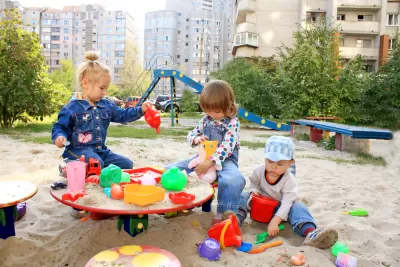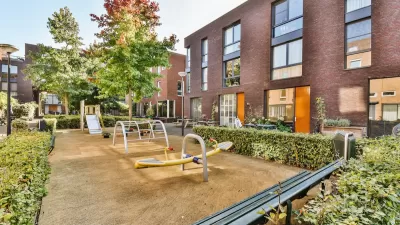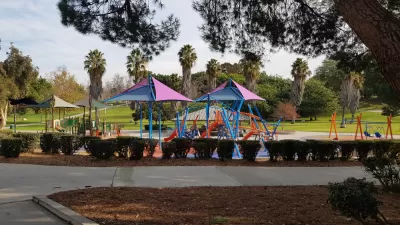Many rankings try to tell parents where the best places are to raise their kids. But measures that focus solely on narrow criteria like safety and schools often ignore the benefits of diverse, vibrant urban environments.

All parents want safe neighborhoods, nice parks, and good schools for their kids. But, sometimes, the places that offer those amenities are often lacking in many other attributes that help kids grow up smart, healthy, and happy. The blog Family Friendly Cities takes to task some of the common measures of "family friendliness" and argues that urban environments, which might score low in many categories, are often better for kids than high-scoring suburbs.
A safe neighborhood would seem to be a prerequisite for family life. But low-crime is not always synonymous with safe. While some neighborhoods may have little violent crime, they may yet be susceptible to the violence of automobile accidents—not to mention the other health effects of auto dependence. In those cases, "what we are likely to find is that many of our beloved and highly ranked sprawl communities wouldn’t rank so highly with their frequent auto collisions, lack of sidewalks and unsafe speed limits."
Low housing costs, and, therefore, the opportunity to live in large spaces would also seem to favor families. But high transportation costs, plus long hours spent in the car, in distant, low-density suburbs can offset what may seem like major savings on rent or mortgages. Similarly, kids in cities can get their education at museums and libraries even if schools are not ranked so highly. And the opportunities for social interaction can be just as valuable for kids as they are for adults. "If we are to truly assess whether a city is child and family friendly then we must acknowledge play and access to play as essential. This includes proximity to residences and the ability to access a diverse range of opportunities for recreation and play."
FULL STORY: What the 'Best Cities for Families' Rankings Get Wrong

Alabama: Trump Terminates Settlements for Black Communities Harmed By Raw Sewage
Trump deemed the landmark civil rights agreement “illegal DEI and environmental justice policy.”

Study: Maui’s Plan to Convert Vacation Rentals to Long-Term Housing Could Cause Nearly $1 Billion Economic Loss
The plan would reduce visitor accommodation by 25% resulting in 1,900 jobs lost.

Planetizen Federal Action Tracker
A weekly monitor of how Trump’s orders and actions are impacting planners and planning in America.

Waymo Gets Permission to Map SF’s Market Street
If allowed to operate on the traffic-restricted street, Waymo’s autonomous taxis would have a leg up over ride-hailing competitors — and counter the city’s efforts to grow bike and pedestrian on the thoroughfare.

Parklet Symposium Highlights the Success of Shared Spaces
Parklets got a boost during the Covid-19 pandemic, when the concept was translated to outdoor dining programs that offered restaurants a lifeline during the shutdown.

Federal Homelessness Agency Places Entire Staff on Leave
The U.S. Interagency Council on Homelessness is the only federal agency dedicated to preventing and ending homelessness.
Urban Design for Planners 1: Software Tools
This six-course series explores essential urban design concepts using open source software and equips planners with the tools they need to participate fully in the urban design process.
Planning for Universal Design
Learn the tools for implementing Universal Design in planning regulations.
Caltrans
Smith Gee Studio
Institute for Housing and Urban Development Studies (IHS)
City of Grandview
Harvard GSD Executive Education
Toledo-Lucas County Plan Commissions
Salt Lake City
NYU Wagner Graduate School of Public Service





























